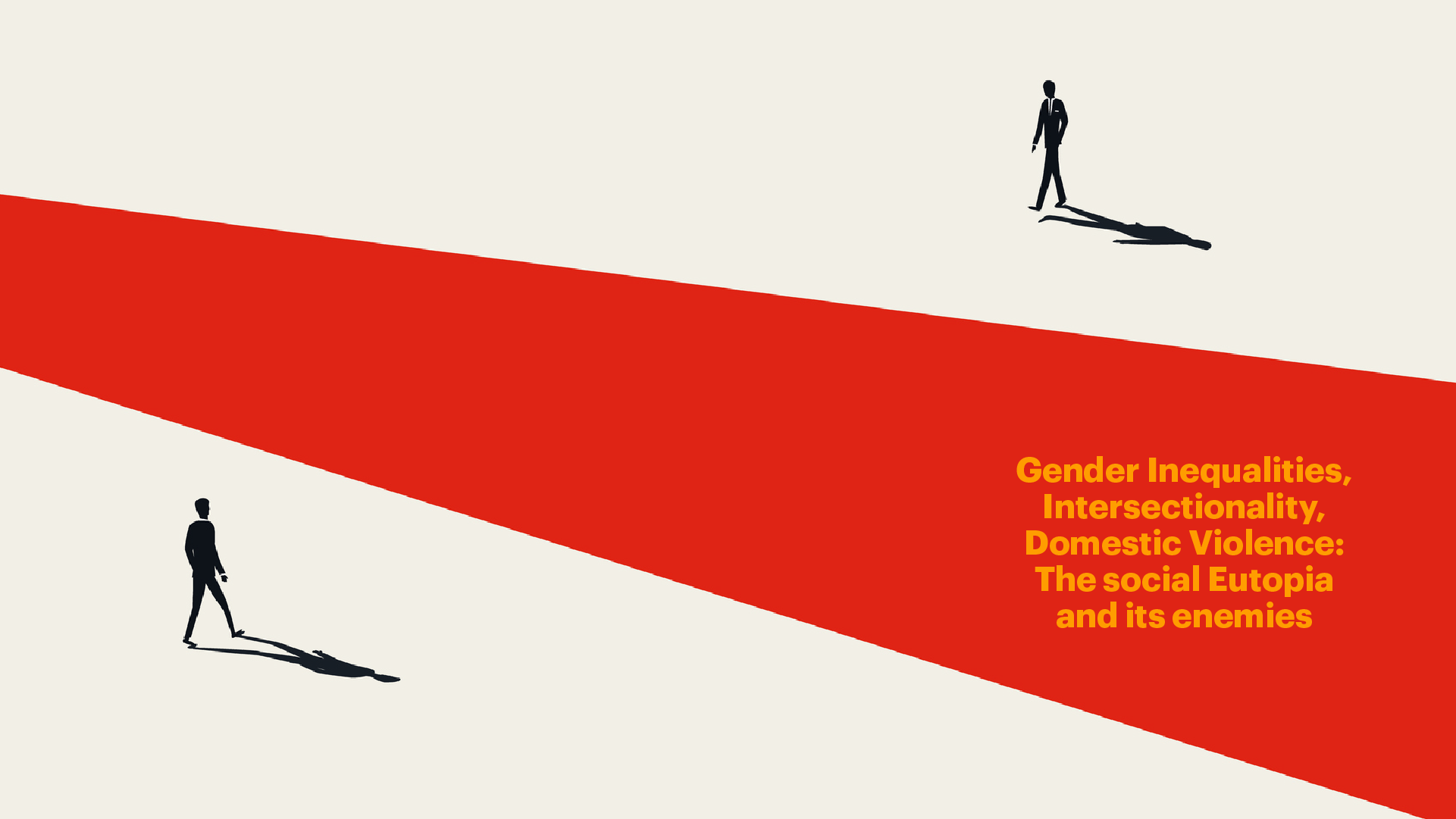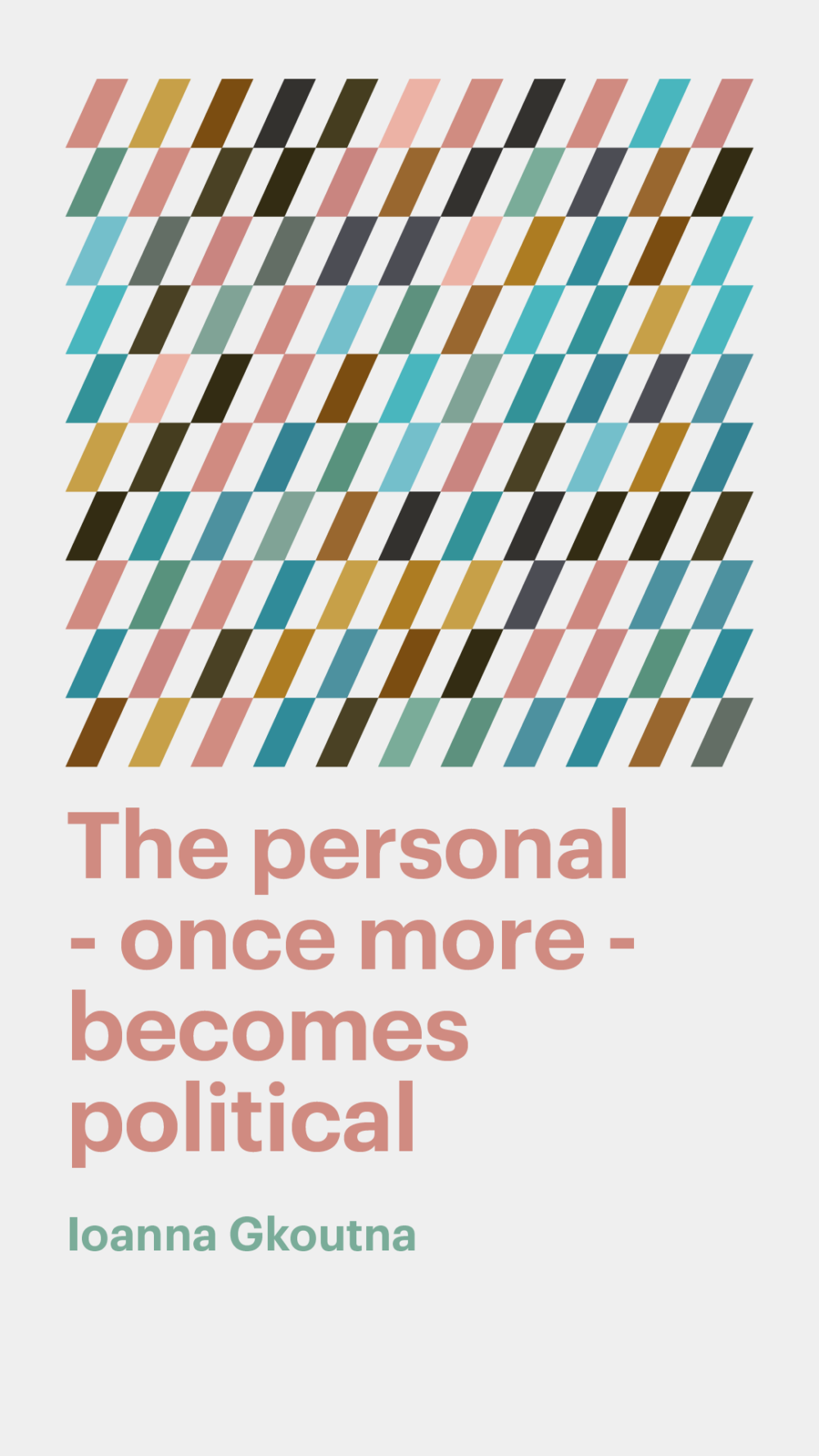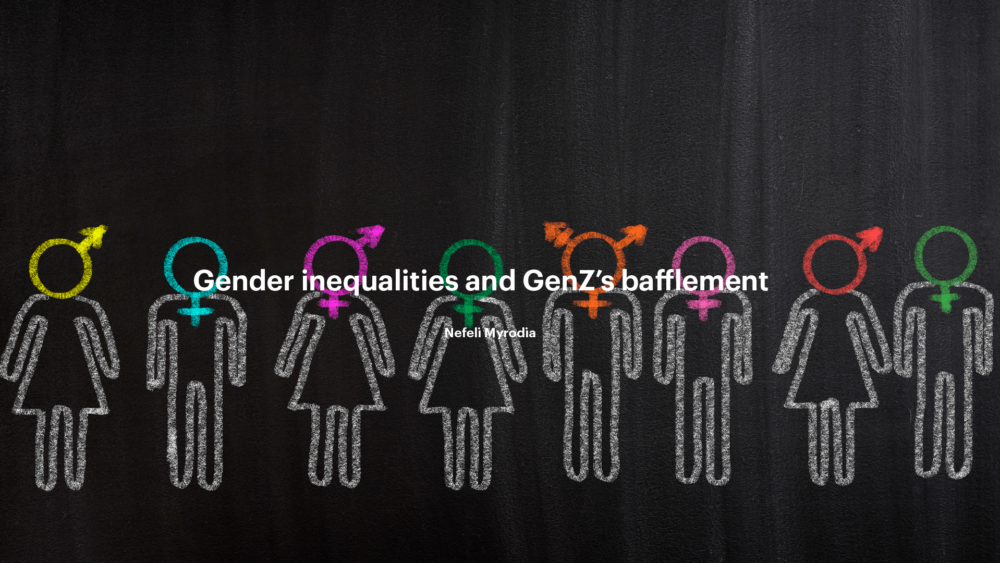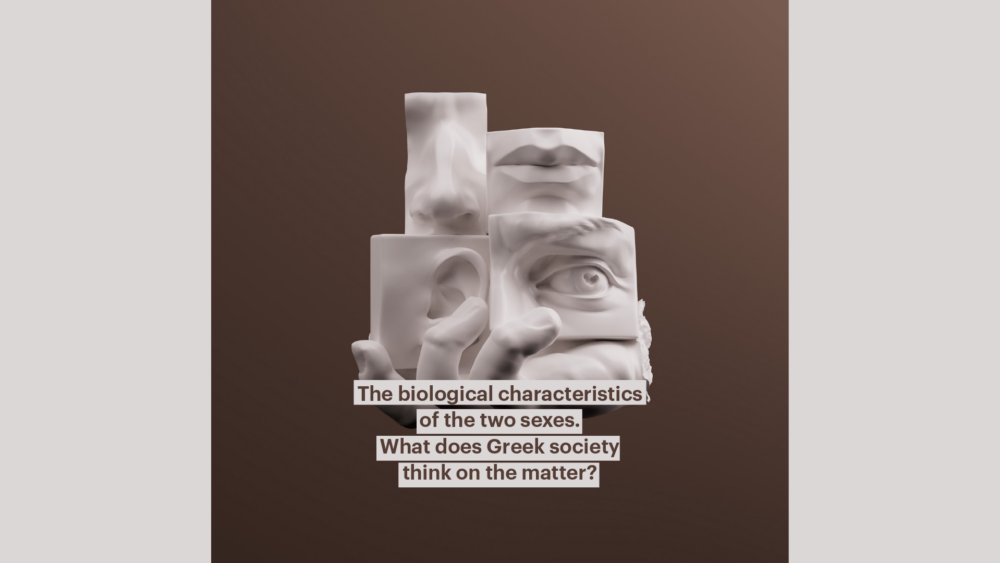
Gender Inequalities, Intersectionality, Domestic Violence: The social Eutopia and its enemies
Europe’s present-day landscape features fruitful debates on inclusion and diversity, and yet the diverse issues surrounding the gender gap, most notably gender inequalities of all kinds, and domestic violence, reveal deep-rooted, repulsive social pathologies and constitute one of the most pressing challenges of our time. Therefore, we need to reiterate the importance of inclusion, inclusiveness and diversity in the discussions aiming to promote a radically more just society.
The concept of gender equality is deeply rooted in the ideas of the Enlightenment and more broadly in modernity. Suffice it to mention thinkers such as Mary Wollstonecraft (1762) and John Stuart Mill (1869) who laid the foundations for the defence of women’s rights leading up to the emergence of the first wave of feminism. Then, following the radical second wave and the multifaceted third wave of feminism (Benhabib, Butler, Cornell, Fraser, 1995), we are experiencing the fourth wave with multiple claims to the dual nature of our socially constructed world between our material reality and our digital hyperreality (Alcoff, 2006; Allen, 2008). Obviously in order to have a clear, informed and emancipatory perspective it is necessary for each person to follow all the pivotal leaps of theory and practice from the first to the fourth wave of feminism in our contemporaneity (Bassett, Kember, O’Riordan, 2020).
Gender Inequalities, Intersectionality and Domestic Violence
Despite the progress made, gender inequality still exists across Europe in various different forms. The concept of intersectionality, introduced by Kimberlé Crenshaw (2005, 2017) in the late 20th century, provides a key framework for understanding and combating gender inequalities. It argues that individuals experience multiple, overlapping forms of discrimination based on their gender, race, class and other social categorisations. Intersectionality therefore highlights how women who, along with their gender, are labelled as “inferior others” of “inferior” race, “inferior” socio-economic class, etc. face complex, severe disadvantages that cause them significant material and psychological harm throughout their lives.
The gender gap includes a whole range of inequalities, such as financial inequality, political underrepresentation and entrenched social norms. Despite partial progress in some areas in terms of gender equality (as recorded in the Gender Divide survey), women still face crucial, systemic and structural barriers. Financially, the gender pay gap in the European Union amounts to approximately 14.1%, while in Greece it is considerably larger although there is no scientifically reliable calculation, with women earning less than men for comparable jobs. This financial inequality is further exacerbated by higher unemployment rates and lower representation of women in senior management roles.
In politics, too, one can observe signs of a pronounced gender gap. The under-representation of women in politics not only limits the different perspectives that should be taken into account in policy-making, but also perpetuates the status quo, thus hindering progress towards gender equality. Social norms and cultural expectations also play a key role in perpetuating the gender gap. Traditional gender roles and norms are reinforced through the media, education and social expectations, and create significant barriers for women in their quest to achieve equality with men in various aspects of personal and collective life.
That said, let us analyse more closely some of the most indicative findings of the Gender Divide survey and consider the initiatives that need to be launched in the immediate future. When asked “do you know/have you heard of the term femicide”, 95.9% of those surveyed replied “yes and I know what it means”, only 3.4% said “I have heard of it but don’t know what it means” and 0.1% said “I haven’t heard of it”. 30.8% agree that Greek society is a “patriarchal society” and 44.3% somewhat agree with that statement. Here it is important to mention the significant differentiation between men and women’s responses (men: 68.7% agree/ somewhat agree vs. women: 81.4% agree/ somewhat agree). At the same time, 60.1% of the participants express support for same-sex marriage compared to 37.4% who disagree and somewhat disagree with this, but at the same time there is a clear, growing opposition to same-sex adoption, with 36.7% saying they agree and somewhat agree with it and 59.9% saying they disagree and somewhat disagree. Also, 35.8% agree and somewhat agree that “women exaggerate when it comes to injustices they suffer due to their gender” while 59.7% disagree and somewhat disagree with that statement. Whereas, when asked whether “women in Greece face more discrimination than men”, 79.9% agree and somewhat agree and 37.4% disagree and somewhat disagree.
If we continue reading the survey findings, we can also see that, overall, 68.3% of the respondents agree that crimes against women should be punished more severely, while 27.9% disagree. However, 80.2% of women call for measures to be taken against gender violence, while the corresponding figure for men is significantly lower, at 56.4% – unfortunately, this particular imbalance speaks volumes.
In every sense, domestic violence remains a widespread pathology, an open and persistent wound in Europe’s body, with Greece being even more affected by this issue that crosses cultural, socio-economic and geographical boundaries. According to the European Union’s Fundamental Rights Agency (FRA), one in three women in the EU has suffered physical or sexual violence since the age of 15. This sad and outrageous statistic underlines the pressing need for comprehensive strategies to combat domestic violence, which is not only a flagrant violation of human rights but also a manifestation of the broader gender inequality that still exists in society. It is both the cause and the effect of the gender gap, creating a vicious circle that perpetuates the subordinate position of women and all femininities. On top of all this, we need to also bear in mind the particularly worrying fact that there is a complete lack of care, protection and monitoring for children who have either been witnesses or victims or both of domestic violence, in terms of whether and how their lives are subsequently supported and developed.
If – and that’s a big “if” – we could take a cautiously optimistic view based on the comparison of the above findings with those of older similar surveys (there aren’t any other 100% matching or equivalent surveys ever conducted in Greece), would it be possible to argue that things are getting somewhat better? Would that really be the case? Even if that was so, this is by no means even remotely sufficient. First we have to define what is best for society as a whole, what is the eutopian goal. Do we want equality, freedom, inclusion, diversity, justice, solidarity to be the main traits that constitute and develop our humanness in the context of the societies we live in today? If so, how can we make this happen? And more importantly, by whom, for whom and with whom do we do it? Also, is combating gender inequalities a crucial goal that can stand alone or, for it to be feasible and sustainable, must it be part of a comprehensive transformation of society in terms of cultural values and socio-economic practices? Is the progress-conservation dichotomy proving to be inadequate, simplistic and outdated when it comes to addressing the range and depth, in terms of spectrum, of the key dilemmas involved in the above issue? Or can it once again be the dividing line if it is reinterpreted without the obsolete constraint of a Hegelian historical linearity? In short, let us look primarily for the socially promoted and the culturally innovative, their point of intersection, which will then feed the progressive. So, in which field should the battles for gender equality and the fight against gender violence be fought primarily? I believe that it should start within the cultural arena (in the broader sense that includes both the cultural values and ideas as well as artistic practices), so that the bold reforms that are necessary at a socio-political and financial level can follow.
Inclusion and Diversity: Exploring pathways to eutopic solutions
Addressing the gender gap and domestic violence requires a multi-faceted approach that prioritises inclusiveness, inclusion and diversity. This translates into the creation of policies and initiatives that recognise and address the challenges faced by women from diverse backgrounds, including minorities, women with disabilities and of course LGBTQI+ individuals.
Bridging the gender pay gap and promoting women’s financial independence is crucial. This includes passing and implementing equal pay laws, encouraging women’s creativity and entrepreneurship, and supporting women in traditionally male-dominated sectors. Increasing women’s representation in political and leadership positions is also essential to ensure that their voices are heard in a meaningful and effective way during decision-making processes. It is also crucial to challenge and transform traditional gender roles and stereotypes. Education and media campaigns can play an important role in reshaping social attitudes towards gender equality. The reinforcement of support services for victims of domestic violence, including shelters, hotlines and counselling services, is vital. Legal frameworks need to be robust, ensuring that perpetrators are held accountable and that victims receive the protection and justice they deserve. The policies that will be implemented must take into account the intersectionality of gender with other identity factors. This means acknowledging and addressing the complex discriminations faced by women of other races, social classes, with disabilities, LGBTQI+ individuals, etc. To sum things up, while Europe has taken some steps towards gender equality, in Greece the persistent gender gap and the high prevalence of domestic violence underline the strong need for more robust and pivotal efforts. By embracing inclusiveness and diversity, Greece can develop more effective and equitable solutions, ensuring that all women, regardless of their background and milieu, can live a life without violence and discrimination.
The contemporary debate on inclusion and diversity adds new dimensions to the fight for gender equality. Drawing on the work of Iris Marion Young, whose “Justice and the Politics of Difference” (2011) critiques traditional notions of justice that overlook the importance of group-specific experiences, boundaries and barriers, we can better appreciate the need for inclusive policies that acknowledge and support diversity. Furthermore, Judith Butler’s theory of gender performativity, as described in the work “Gender Trouble: Feminism and the Subversion of Identity” (1990), which challenges the binary understanding of gender, calls for a broader understanding in terms of gender inequalities that includes non-binary and transgender individuals as well as all kinds of femininities. Butler’s views remind us that true gender equality must include the rights and recognition of all gender identities, transcending traditional dichotomies, and that combating intersectionality inequalities requires ensuring advanced, innovative public policies that are radically inclusive of all women.
Also, through the capabilities and morally responsible rights approach, Martha Nussbaum offers us a valuable perspective on addressing gender inequalities and domestic violence. Nussbaum argues that justice should be about creating and promoting the cultural and socio-political conditions that are necessary for people to develop and fully exercise their capabilities. In the present context, this means that society must ensure in a universal way that women have the freedom and support to lead their lives without any kind of fear or harm, with constant and unimpeded access to justice and equipped with the necessary means that would allow them to build and support their lives equally and independently.
To achieve and secure the above, both in the physical and digital world, we need to have a strong voice and an active role in shaping our future worldview. The contemporary digital revolution is reshaping autonomy dynamics across its individual and collective manifestations, taking into account both the empowering and constraining aspects of digital environments. The use of digitality on the one hand can empower individuals through the democratisation of knowledge and the strengthening of their voices and promote collaborative, relational autonomy, but on the other hand it can also limit personal and collective autonomy by concentrating manipulative forms of power through opaque algorithms that promote the users’ surveillance and manipulation as well as the commodification of data, while promoting a purely individualistic, narcissistic form of autonomy, which of course leads to and multiplies the aforementioned problems of gender inequalities and violence. We must therefore realise the dual nature of digitality by describing it with the appropriate discursive tools and then normatively decide which of its manifestations to support and develop.
The ongoing fight for gender equality and against domestic violence remains an absolutely crucial challenge for our time. As our country progresses into the 21st century, the dialogue around said issues becomes increasingly challenging as it intersects with the socially fruitful notions of inclusiveness, inclusion and diversity. The first step is the descriptive part: to understand and articulate what is happening. We don’t seem to be asking the right questions just yet. Then, we need to propose solutions that would serve as signposts directing us forward. But what will the main directions or our destination be? What should we create anew and what should we defend? Certainly equality, freedom, originality, justice, respect, solidarity, etc., between every person regardless of gender and sexual orientation, i.e. a specific, revised and enriched value system, which, in order for it to be able to be implemented tomorrow, we need to formulate its visionary dimension today.
Alcoff, Linda Martín, 2006, Visible Identities: Race, Gender, and the Self, (Studies in Feminist Philosophy), Oxford: Oxford University Press.
Allen, Amy, 2008, The Politics of Our Selves: Power, Autonomy, and Gender in Contemporary Critical Theory, (New Directions in Critical Theory), New York: Columbia University Press.
Benhabib, Seyla, Judith Butler, Drucilla Cornell, and Nancy Fraser, 1995, Feminist Contentions: A Philosophical Exchange, (Thinking Gender), New York: Routledge.
Bassett C., Kember S., O’Riordan, K., 2020, Furious : technological feminism and digital futures. London: Pluto Press.
Butler, Judith, 1990, Gender Trouble: Feminism and the Subversion of Identity, New York: Routledge.
Crenshaw, K., 2017, On Intersectionality: Essential Writings, New York: The New Press.
Crenshaw, K., 2005, Mapping the Margins: Intersectionality, Identity Politics, and Violence against Women of Color, in R. K. Bergen, J. L. Edleson, & C. M. Renzetti, Violence against women: Classic papers (pp. 282–313), Pearson Education New Zealand.
Mill, John Stuart, 1869, On Liberty and The Subjection of Women, London: Longmans, Green, Reader, and Dyer.
Nussbaum, M., 2011, Creating Capabilities: The Human Development Approach, Cambridge, Mass.: Harvard University Press.
Wollstonecraft, M., 1792, A Vindication of the Rights of Woman: with Strictures on Political and Moral Subjects, London:Printed for J. Johnson.
Young, I. M., 2011, Justice and the Politics of Difference, Princeton, NJ: Princeton University Press.



